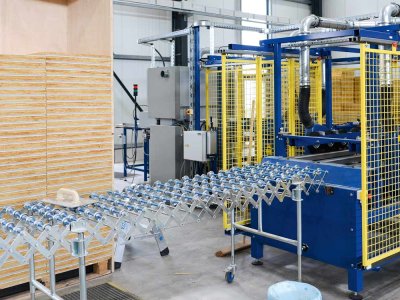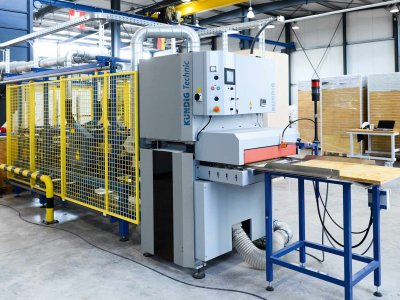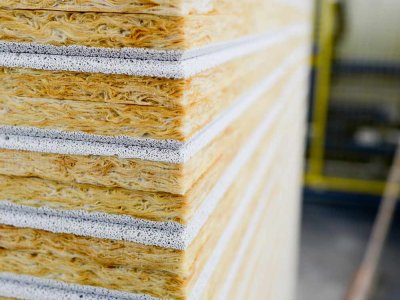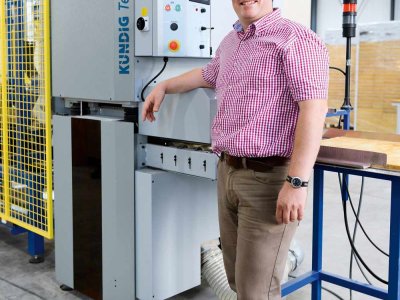Baswa: Sanding of Foam Glass Gravel
 It is one thing to produce a working lab pattern and another to start a production on a large scale, Bernhard Hanisch of Baswa acoustic AG believes. Know-how from Kündig has helped tremendously in the implementation of an important manufacturing step during the acoustic panel production.
It is one thing to produce a working lab pattern and another to start a production on a large scale, Bernhard Hanisch of Baswa acoustic AG believes. Know-how from Kündig has helped tremendously in the implementation of an important manufacturing step during the acoustic panel production.
The history of today’s stock corporation Baswa began as a typical new venture start-up in Baldegg, Switzerland. In 1991 the now 83-year-old Hans Dieter Sulzer founded an enterprise for the production of his prize-winning acoustic insulating panels. The basic idea of the inventor was typical of his way of thinking: “Nobody else would probably have had the idea to use glass for this”, reports certified engineer Bernhard Hanisch, member of management board and responsible for production in the German Baswa plant in Gotha. “His idea resulted in a high tech sound insulating system with tailor-made qualities.” The acoustic panels can be installed on the construction site almost as easily as plaster boards. Special plaster materials also form part of the system, which allows a jointless seam and has very good sound absorption qualities.“

Acoustic Panel without Holes
The unusual aspect of Sulzer‘s idea is the aforementioned use of glass: “The acoustically effective material of our panels is so-called “foam glass“. “These are globules with air bubbles made from recycling glass”, explains material engineer Hanisch. “The ground glass is melted in a rotary stove at 800°C to form glass foam balls, from which the granulate consists. It thereby gets excellent warmth- and sound-insulating qualities.” With a polymer binding agent Baswa produces panels from this granulate: “In contrast to expanded polystyrene panels, our material is pressurestable and even has other advantages like fire resistance.” Foam glass granulate with a grit of 1mm is used for the panels. For the plaster belonging to the system, other materials with grits down to 0,5mm are used. “So we can influence the important echo time for acoustics directly.” Hard plastered wall surfaces of stone or gypsum would reflect sound strongly: “Our material does not”, Hanisch proudly states. Today Baswa exports acoustic insulating systems worldwide and can refer to numerous references.
Glass is unequal to Stone
What worked very well in the lab of the inventor Hans Dieter Sulzer, turned out to be very difficult in the technical implementation, Hanisch reports about the development: “Originally we thought, we must work on the new material like stone. However, this did not work at all.” Production looked easy at first – the foam glass granulate and the polymer binder is mixed to a paste, applied to glass wool panels and then hardened. “But then we faced the problem, that we need a steady thickness and a smooth surface, to be able to move the panels precisely and to plaster them cleanly later.” Attempts with procedures for stone treatment ended, putting it mildly, disastrously: “So we have tried quite pragmatically to sand the panels on a carpenter’s workshop sanding machine.” This worked quite well on the conventional wide-belt sanding machine, they specially purchased for this purpose, he remembers about his experiences. “However, the surfaces were sanded very wavy because of the flexible insulating layer on the back. And the machine was soon a total loss, because of the aggressive glass dust in bearings and spindles.”
KUNDIG showed, how it works
This was the moment they encountered Kündig: “I am a material engineer, not an application engineer”, clarifies Hanisch. “We looked for a more long-lasting substitute for our wide-belt sanding machine. At that time I did not know that precision industry sanding machines are made in Switzerland. Otherwise we would have bought the Swiss product immediately as a Swiss start-up.” The contact with Stefan Schöttli of Kündig turned out to be a stroke of luck: “Otherwise, we would experiment but not produce even today, because our machine supplier at that time simply did not take control of his technical problems. Kündig has shown to us that it is possible.” The experienced Schöttli immediateley recognised that the mistake was in the applied sanding procedure, explains Hanisch. “We not only want to smooth our panels, but also to increase the acoustically effective surface even further by breaking open the glass globules.” At that time the panels were treated on a conventional wide-belt sanding machine working from the top. “Schöttli explained to us that one achieves only a low and irregular sanding effect in this case, because the panel can move in relation to the sanding head on account of the springy insulating layer on the back.” According to a thorough analysis of the production line, Schöttli recommended the need for a bottom sanding machine: “So we could also eliminate the need for a turning unit in the line.” The panels are sanded first, then formatted along and turned 90° to format them crosswise. Now with the aggregate on the bottom it was not necessary to turn the panels after sanding for edge treatment.
Custom built precision sander
As a solution to the technical problems, the adaptable construction of Kündig machines is a benefit, Kündig sales manager Stefan Schöttli tells us: “With the modular construction of our machines we can easily adapt them to meet special customer requirements. This keeps costs low even with very special machines. Kündig delivered a Technic 650 R-Botex in Thuringian Gotha. This is the second industrial sanding line for Baswa, after the first they purchased for the parent company in Switzerland. Instead of a sanding pad it is equipped with a roller, which provides absolutely level surfaces even with the flexible insulating material at the back. Untimely wear by the glass dust was met constructively with encased bearings and dust cuffs at the crucial points. “Glass granulate is like constant sandblasting”, Hanisch knows from practice, “Up to now Kündig delivered the only machines, which provide resistance to this brute stress on a continuing basis.” Kündig is used to such demands from the aircraft- and automobile industry which Kündig also supplies, Schöttli replies.
Dust Free Panles
However, not only the protection of the machine was important to Hanisch, but also health risks should be eliminated for his employees in production and later for the manufacturers: “Finally, it would not be very pleasant if by the installing of our panels over head, glass splinters would fall into ones eyes ”, he points out, “therefore, the panels are already cleaned inside the sanding machine very efficiently with compressed air and a dust suction unit. Kündig has solved the fight against dust so well, that practically no emmissions from the machine and the panels leave the line free of dust.”
Hot Keys
However, in an industrial production, trouble-free operation is also important, says Hanisch: “We only have thickness changes. Nevertheless, the adjusting was time-consuming with the previous machine.” This has changed significantly with the acquisition of the Kündig-precision sanders: “The touch of a key is enough to change the sanding-programme.” Different panel thicknesses are assigned to the hot-keys on the control: “This means no more delays with changing the panel thickness.” If the constantly used machine needs servicing this is also not a problem: “When Baswa founded the Gotha-plant to produce within the European Union and to be closer to the German market, we found out that Kündig had already established a production facilty here for more than 20 years”, he smiles. “The competence of the Kündig engineers allowed our innovative product technically in an important treatment step. Maybe we owe our success partly to Kündig”, he finishes by saying.



